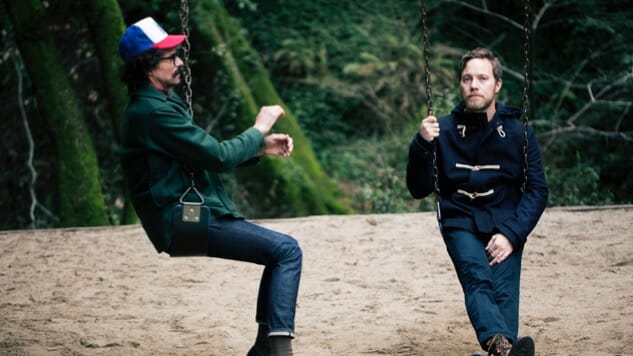Rogue Wave: Delusions of Grand Fur in the Age of Spotify

“Humans are not robots, at least at this point,” says Zach Rogue, laughing with exasperation. He isn’t pitching a sci-fi screenplay. He’s venting about the music industry—namely the mechanical way people record and consume albums in the Spotify age. His targets include the “shitty compression” of modern indie-rock and the lifeless, one-dimensional mastering techniques that dull emotions and tire ears.
“I’m frustrated with where the music business is, or where we are,” he says. “It’s kind of hard to penetrate the void right now. But I appreciate when bands take chances. I love Unknown Mortal Orchestra. Their records aren’t super loud and hi-fi, but they’ve got so much soul. A lot of the music that I’ve been liking goes against the grain. Even Arcade Fire—as massive as that band is, they master their records pretty quiet, almost daring the audience to fucking listen for a minute. Mastering levels have gone so crazy. I feel like we’re trying to penetrate people’s earbuds and force them to listen. The best teachers are the ones who taught quietly so the students will just listen.”
Rogue knows the importance of that lesson since he learned it firsthand, bowing to the demands of a fickle rock business—either by glossing up his music (2010’s depressingly slick Permalight) or re-recording a fully fleshed-out album with an outside producer (2013’s Nightingale Floors). He and collaborator/producer Pat Spurgeon conceptualized Delusions of Grand Fur, their sixth Rogue Wave LP, as a return to the DIY energy that defined their early material, tracking the songs at their Oakland studio/practice space without the aid of a single hired hand. That bold leap paid off: Grand Fur maintains the intimate yearning of early Rogue Wave while venturing down some experimental new paths.
“One of the things I really regretted about the last record—other than the fact that it was never promoted—was the way we recorded the entire album,” Rogue says. “We did these really ornate demos for Nightingale Floors over eight or nine months. Then we re-recorded the entire album with John Congleton. I adore him, so I was go glad to be working with him, but it was redundant to do the album twice. So [with Delusions of Grand Fur], we decided that instead of demoing stuff, we’d just experiment as we go, and whatever it is the demo is the song. Instead of re-chasing some feeling, like, ‘I wasn’t trying that hard because I was spitballing,’ just let the spitballing be the song this time. I didn’t want to make sounds that didn’t sound like us. For better or worse, I wanted it to sound like the way we sound when we’re reaching for something, rather than when we already got there.”
The classic producer cliché is not to record demos because you’ll fall in love and never recapture the spark in a proper studio. But Rogue and Spurgeon side-stepped that problem by never drawing a distinct line between songwriting and recording. Working with an array of vintage ‘80s synths and guitars, they created patchworks of lo-fi and hi-fi sounds, of digital and analog—generating tracks from all possible sources (Phone voice memos, four-tracks, eight-tracks, ProTools) and intentionally leaving ideas “half-baked” in order to make the sessions more spontaneous.
“I’ve been making records now for a while, and I have experience doing it, but I still don’t feel comfortable in fancy, state-of-the-art studios,” Rogue says. “I’m not sure that’s necessarily even meant for me. When we’re in our studio, I feel like myself. Sometimes me and Pat would be recording something and I’d be like, ‘I know this sounds dumb, but I really like how the acoustic guitar sounds on the iPhone when I was singing the idea in there. I like how my voice sounds when I was barely singing.’ So we were like, ‘Well, if we like how that sounds in there, then let’s just use that!’”
-

-

-

-

-

-

-

-

-

-

-

-

-

-

-

-

-

-

-

-

-

-

-

-

-

-

-

-

-

-

-

-

-

-

-

-

-

-

-

-








































